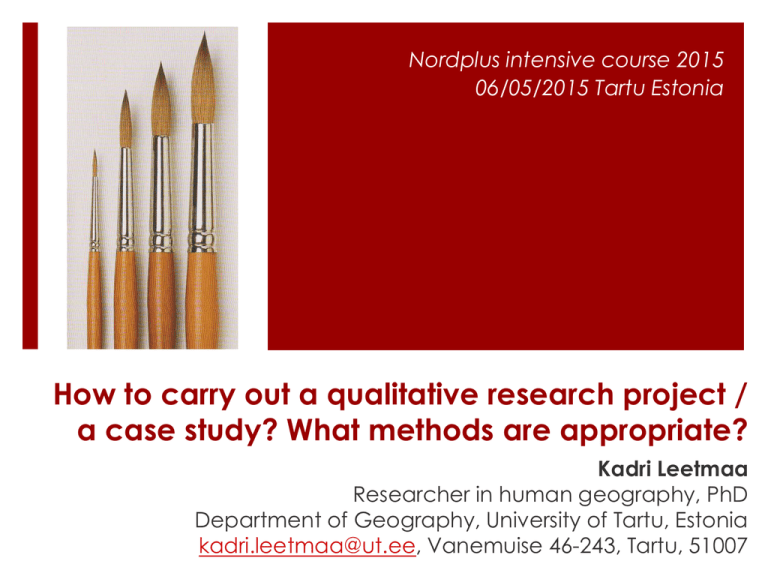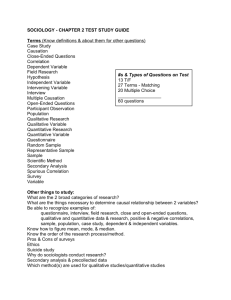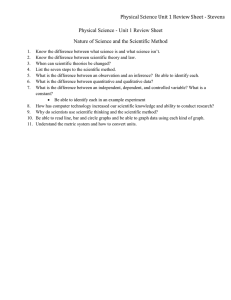Qualitative methods in urban and regional research - UEF-Wiki
advertisement

Nordplus intensive course 2015 06/05/2015 Tartu Estonia How to carry out a qualitative research project / a case study? What methods are appropriate? Kadri Leetmaa Researcher in human geography, PhD Department of Geography, University of Tartu, Estonia kadri.leetmaa@ut.ee, Vanemuise 46-243, Tartu, 51007 Aim of the lecture To refresh our knowledge / to think back to our previous experiences before entering the field Where do qualitative research strategies and methods locate on the landscape of different research methods? My own research background Individual-level Census data and Population Register, various surveys, secondary statistical data, qualitative interviews with residents, expert interviews, content and discourse analysis, observation techniques, … “Triangulation” in social sciences = taking different perspectives Quantitative & qualitative Classical opposition You are positivist !!! How can you presume that such “simplified” categories exist. But so many other explanations exist !!! Causality issues. How can you make such conclusions based on only six interviews? Who do your interviewees represent? Indeed … In quantitative research correlations that we find tend to simplify the combination of the causes in the real world. In qualitative research people often ignore the representation question and extend explanations too far. Causality in the real life Reasons to decide for qualitative approach? Compare! Compare! Reasons to decide for a qualitative approach Opportunity to create an understanding of the phenomenon relatively quickly Opportunity to design the research project from the beginning to the end Opportunity to be an expert of your own data Cheaper research costs Lack of former clear hypothesis, need to explore … or … lack of good quality quantitative data … lack of quantitative research skills A unique opportunity to use all your senses. Qualitative research attitude Which qualitative methods we know? Interviews Focus group interviews Observation, participant observation Documentary and textual analyses Critical discourse analysis … In fact…, it is possible to use these methods but not to make qualitative research Qualitative philosophy (research attitude) rather than data collection methods Which are our assumptions? Reality exists. With gathering empirical data we can experience it. People create reality also with their thoughts, feelings and irrationality. Scientist is objective, knowledge is value-free. Making science is a social activity. Scientists have responsibility. People tend to behave rationally. Our task is to discover universal laws. Scientist is never objective, instead he/she should reflect his/her subjectivity. Also rare events are causal. Some very basic questions to be asked What is the role of researcher? What rights we give to participants? How much we impose our previous concepts? … How theory and data are related? Both quantitative and qualitative data are data! Theory before – verifying and developing the existing theory. Theory after – creating the theory. Deductive approach Inductive approach Unique events vs. general rules Searching for general regularities and theories. Stressing subjectivity, uniqueness, singularity, context. Nomothetic Idiographic How many is many? Is the unique event less causal and less worth for studying? Pre-structured vs. unfolding research Specified research question Pre-structured research schedule Pre-structured data General guiding research questions Flexible research schedule Unstructured or semi-structured data Qualitative research Quantitative research Punch 1998, 23: timing of the structure Combining the methods To start qualitatively, to gather “categories”, more informed quantitative study is designed later. To start with quantitative data and to explore later which processes are behind the regularities. (to combine different qualitative and quantitative sources) Qualitative research strategies & data collection methods Strategies and methods Strategies + attitudes How collect and organize data? case study observation ethnographic study in-depth interviews grounded theory approach group interviews action research … content analysis … Strategies Case study Case study Intensive research strategy. Aim is to understand this particular case thoroughly, in its natural environment. Often using various relevant data and methods in parallel (triangulation). A unique/deviant case, extreme cases, a typical case, diverse cases (covering variance), most similar/most different cases, influential case, Seawright and Gerring 2008. Case selection techniques in case-study researc: a menu of qualitative and quantitative options. Political Research Quarterly, 61(2). Strategies Ethnography Ethnography Describing the “culture” and understanding the life-style as it is conceptualized by the “locals”. Gathering meanings and categories. Need to participate in order to understand. Strategies Grounded theory Grounded theory Creating the theory and progressively controlling it. Useful when there is no preexisting theory or explanation. … until “theoretical saturation” has reached Strategies Action research Action research Take off your white cloves !!! Both participants and researcher have responsibility to change the things better, if needed to intervene. Action research ! Knowledge and common understanding created during a typical planning process (meetings, group discussions). Interviews Reasons for in-depth interviews Additional knowledge to other methods (e.g. statistics) To encourage people to argue and reason (compare: observation techniques) To understand the complicated network of causes. Structured, semi-structured and unstructured INTERVIEWS Methods Interviews Structured Semi-structured Unstructured Formulated questions, fixed order Main topics and questions are formulated Only main topics are decided, but new topics may arise. Formulated options for answers Possibility to change order of topics, to add new Enables quantitative questions analysis Open-ended Direct contact with questions, answers person (compared not known with a survey research) Aim is to explore, former hypotheses and knowledge do not exist. Interview is truly qualitative if… … the interviewer is interested in the interpretations of the participants, aim is to understand how the daily routine has been constructed and what are its drivers. Subjective theories are accepted and they influence the final conclusions made by the researcher. “When a person defines a situation as a real, then the situation is real and brings along certain consequences …” Flick 1998 Informant vs. expert interview Interview with an informant Interview with an expert Interviewer should not be an expert !!! Interviewer should not be an outsider !!! Sampling in an interview research Purposive sampling Theory-driven sampling (analytical groups, sampling ahead of the research) Theoretical sampling (grounded theory approach, sampling as the study develops) Which cases (persons) you should study to understand the phenomenon under study (extreme, covers the variance, certain groups, gatekeepers, those who are able to reflect different views)? Group interviews Number of interviewers and interviewees Individual interview: one-to-one Two or more interviewers (trust between two persons, feeling equal) (with stronger expert group, combining the knowledge of the interviewers) Double interviewees or small group Group interview with one interviewer and assistant(s) (if the interviewee does not speak) (focus group, group processes) Main reasons to choose for a focus group interview 6-8 persons Moderator (Observant-assistant) Group processes as the aim (cheaper? less time consuming?) domination, being shy, being active, being passive, agreeing always, discussing, getting angry, being winner in a discussion, being a leader, being a follower, … How to create a good group? Homogeneous group, equal members Comfortable environment People are interested, wish to change the issue, believe that something will be changed Classical problems Established relations of domination Discussion have been held long before the interviewer arrived Topics that do not create discussion Over-exploited topic, controlling Opposition of personalities Discussion deviates to the topic that also inspires To ensure the successful focus group interview Clear roles between the moderator(s) and assistant(s) Good and prepared “setting” Successful and inspirational intro (aim, ideas) Logical interview schedule, order of the topics Not too many topics (logical transitions to next sub-topics) Logical end The personality of the interviewer and moderator Interview has to be in the hands of moderator. Interviewer should not dominate, creating co-operative environment Interviewer is also a personality and he/she participate in the communication and group processes. Good and bad questions and techniques M.Q. Patton (2002) Qualitative research and evaluation methods Enjoy being on the field !!! Thank you! Questions !?!






